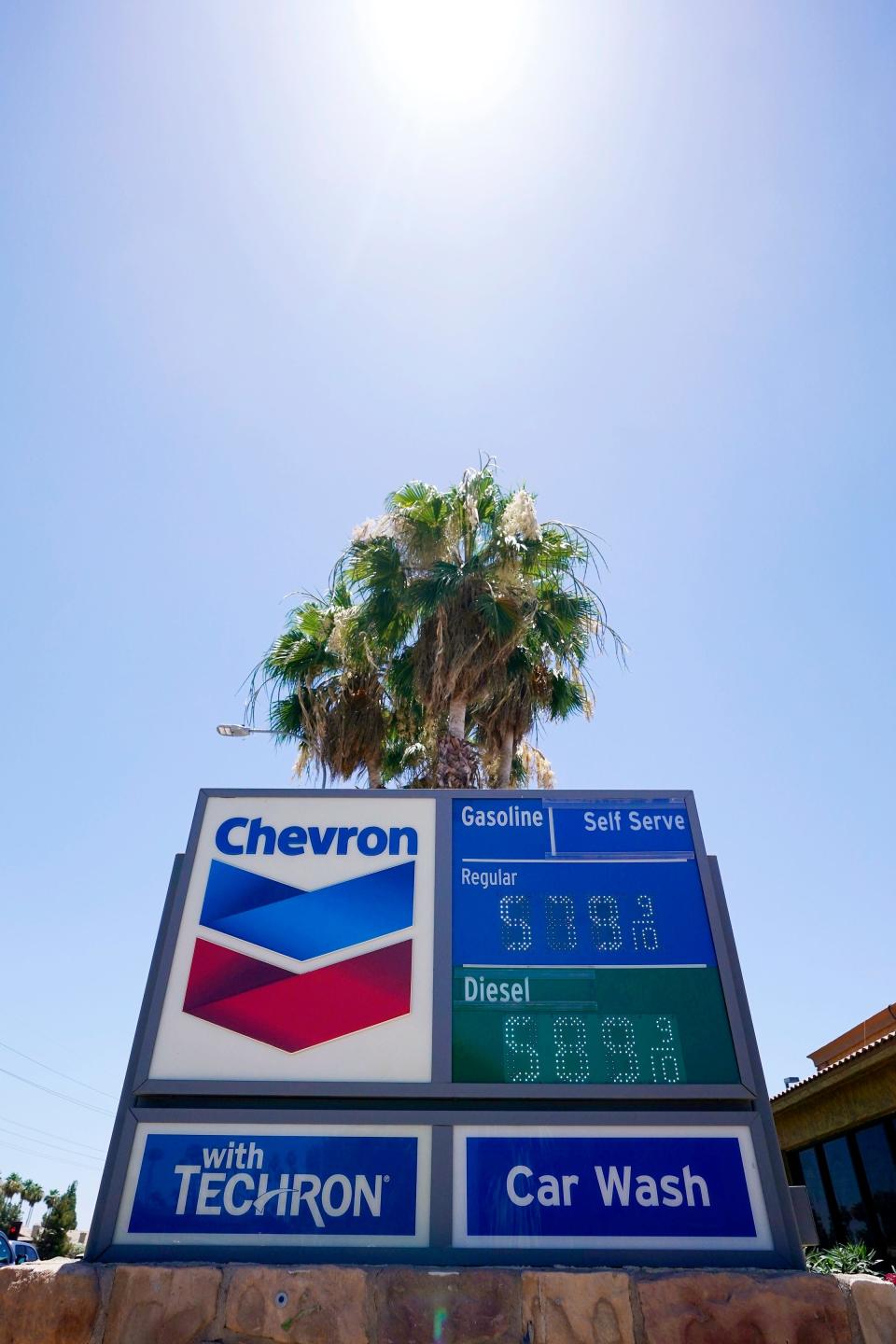Biden is calling for a 'gas tax holiday.' What do gas taxes pay for?
- Oops!Something went wrong.Please try again later.
WASHINGTON - In response to the high gas prices pummeling drivers, President Joe Biden on Wednesday will call on Congress to temporarily halt the federal tax on gas and asked states, which have their own gas taxes, to take similar action.
The primary measure Biden requested is a federal gas tax suspension through September.
"President Biden understands that high gas prices pose a significant challenge for working families," the White House said in a statement. "Today, he is calling on Congress and states to take additional legislative action to provide direct relief to American consumers who have been hit with Putin’s Price Hike."
Here's what you need to know about the proposal and how it could affect you.
Biden's proposal: Biden to propose three-month federal gas tax holiday to ease soaring prices at the pump
What are gas taxes?
Taxes are levied on gasoline, diesel and gasohol, which is a mix of ethanol and unleaded gas, at the federal and state levels.
The federal gas tax is 18.4 cents per gallon on gasoline and 24.4 cents per gallon on diesel fuel. On top of that, states have their own gas taxes. State gas taxes vary, but cost an average of 26.2 cents per gallon on gasoline and 26.7 cents per gallon on diesel. The highest state gas taxes are in California (68.2 cents) and Pennsylvania (58.7 cents), and the lowest is in Alaska (15.1 cents), according to the American Petroleum Institute.
The cost of crude oil aside, the taxes are the main factor in determining gas price at the pump, adding more to the price of a gallon of gas than refining costs, retail markup and transportation expenses, USA TODAY previously reported.
Gas prices color midterms: Biden considers addressing record high gas prices as midterm elections loom
What does the federal gas tax pay for?
Most of the money collected from the federal gas tax goes toward highway infrastructure, via the Highway Trust Fund, which pays for most federal spending on highways and mass transit.
The Highway Trust Fund was established in 1956 to create a dependable source for federal funding of construction and interstate highway projects, according to the Peter G. Peterson Foundation. There are two parts of the fund: the Highway Account, which is mostly devoted to highways and bridges, and the Mass Transit Account, which pays for the purchasing and upkeep of buses, railways and other forms of public transportation.
The Highway Trust Fund was projected to be insolvent, or unable to pay the debts it owes, by 2022. But in November, a bipartisan infrastructure bill signed into law. The bill included an $118 billion revenue transfer to the fund, extending its near-term solvency through 2027, according to the Committee for a Responsible Federal Budget.
Federal gas and diesel taxes in 2020 accounted for 84% of revenue for the Highway Trust Fund, for a total of some $43 billion, according to the Congressional Budget Office. This year, the Committee for a Responsible Federal Budget similarly projects more than $42 billion in revenue will flow into the Highway Trust Fund, more than 60% of which will come from the federal gas tax.
The federal gas tax hasn't been updated to keep pace with inflation since 1993; if it had, the current gas tax would be about 33 cents per gallon and 44 cents per gallon on diesel fuel, according to the Tax Policy Center.
State gas taxes mostly pay for things like road construction and maintenance, according to the Urban Institute. But some states divert those funds to seemingly unrelated expenses, like environmental programs, law enforcement or tourism, the Reason Institute found.
Who's to blame? Gas prices surge again to record high but the driver is refineries, not oil prices

What is a 'gas tax holiday'?
Biden's proposal of a three-month federal gas tax holiday, which requires congressional approval, would act as "a little extra breathing room" for Americans dealing with record high gas prices, the White House said in its statement.
The national average for a gallon of gas was $4.955 on Wednesday, according to AAA.
The White House wants Congress to offset the would-be $10 million loss of highway funds caused by the gas tax holiday with other federal tax revenue, arguing that with the federal government's deficit down $1.6 trillion this year, the U.S. can afford it.
Some states have independently taken steps to suspend their gas taxes, including Connecticut, Georgia, Florida, Maryland and New York. Other states have made efforts to lessen the impact of gas taxes by holding off on planned tax hikes or examining other consumer fees.
Biden to oil companies: With gas prices at $5 a gallon, Biden tells oil companies to cut costs for Americans
Who's against a gas tax holiday?
However, there are plenty of critics of the measure, including in Biden's own party.
Larry Summers, former Treasury secretary in the Clinton administration and an economic adviser for President Barack Obama, this week called it "a gimmick" that doesn't solve the underlying issues causing the price spike.
Record high gas prices: With gas prices at $5 a gallon, Biden tells oil companies to cut costs for Americans
Some economists say the end of the holiday could increase inflation and deplete transportation funds, for a low pay-off, while environmentalists argue the gas tax undermines the effort to move toward clean energy.
Plus, Biden's proposal has to pass Congress with at least 60 votes to avoid a Republican filibuster.
Biden will make his case for a gas tax holiday during a 2 p.m. ET speech Wednesday.
Contributing: Joey Garrison
This article originally appeared on USA TODAY: Gas tax holiday: What are gas taxes and what do they pay for?

